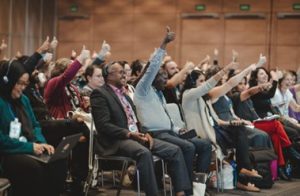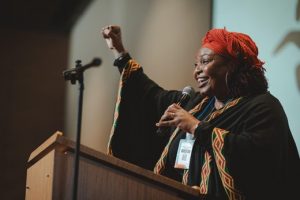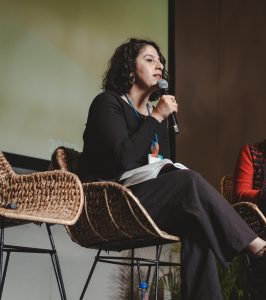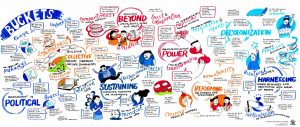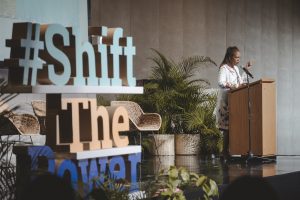It takes all of us: Shifting power and decolonizing development
05 Feb 2024
This blog originally appeared on the Stopping As Success website.

(L – R): Grace Boone, CDA Collaborative Learning & Jasmine Kato-Naughton, Peace Direct (Stopping As Success consortium members)
“This is not just for the Global South, but for our global survival,” Nana Afadzinu, Executive Director at West Africa Civil Society Institute (WASCI), told us as 700 people from 70+ countries gathered for the #ShiftThePower Global Summit in Bogotá, Colombia this past December. We spent the following three days at the Summit discussing the role we all have to play to shift power, build solidarity, heal from trauma to transformation, decolonize philanthropy and aid, and so much more.
It’s difficult for humans to imagine the future. And, as difficult as it may be and has been, those of us at the Summit did just that. We were able to articulate what we’re working towards and how to do that together: a world without logos, silos, egos, or halos (as one breakout group named it) where we are all working towards our collective liberation. To get there, we all have a role to play: to imagine, articulate, and work towards this future. We need all of us to do this.
As we enter into a new, hopeful, and deeply uncertain year, the Stopping As Success team (SAS+) continues to be challenged and inspired by the ideas and people at the Summit. As a team dedicated to supporting organizational transformation that truly shifts power, what we heard had so much resonance with our work. In particular, the need to work ourselves out of a job and how each of our organizations are responsible for helping to shape sustainable ways of working in the now and beyond. We also deeply resonated with the theme of collective care, reminding us to care for ourselves and each other as we navigate the changes that must come to shift power.
To process and make meaning of our time together at the Summit, we’re sharing three key lessons we’re carrying as individuals, organizations, and for the wider system. Whether you were at the Summit or not, we hope these reflections are practical for your role in making change and inspire you to join our collective efforts to #ShiftThePower.
1. Shifting power as individuals
Barry Knight, an adviser at the GFCF, collected data leading up to the Summit and found a significant gap between people’s desire to build a “good society” and their prioritization of self-care. The challenge with this gap – wherein people aren’t prioritizing taking care of themselves – is that without people who are sustained, nurtured, and supported in this challenging work of shifting power, our efforts will ultimately fail. We can’t shift power if we’re exhausted and burned out. As Audre Lorde puts it: “Caring for myself is not self-indulgence, it is self-preservation, and that is an act of political warfare.”
So, for the SAS+ team, we start here: by taking care of ourselves and supporting each other to do this well and often. For us, this looks like building strong relationships with one another that are rooted in trust and respect so that we can communicate when we need to step away from work and ask a colleague to step in. It looks like creating moments of pause – especially our quarterly no calls weeks – so we don’t have to be productive and can tap into inspiration. It looks like celebrating small wins to remind ourselves that, while our work is never done, we are taking deliberate steps and our efforts are working. Joy is essential to sustaining change work, so we create moments for it in group spaces to uplift our work and one another. In this way, we practice collective care, knowing we are, in part, responsible for each other’s well-being as a team.
2. Shifting power as organizations
“Shifting the power means seeing the compelling life force that communities hold.” – Marie-Rose Romain Murphy, Haiti Community Foundation
Many INGOs are shifting their ways of working and operating models to better align with the principles and values of “locally-led” and “decolonization.” The Summit celebrated how organizations are shifting, while also reminding us that there is much more to do. There is a role for INGOs to play to build solidarity and shift power. There is no longer room for “transactional solidarity; [we have to] interrupt systems of power” as Soheir Asaad, Director of Advocacy at Rawa Creative Palestinian Communities Fund, named. One way for INGOs to do this is to transition out of contexts or partnerships, to actively practice letting go of power. As SAS+, we’ve been researching effective and sustainable ways to do this. Our resources are a good starting place.
Meanwhile, there’s a call for proximate organizations to become less dependent on aid by creating smaller and more proximate organizations and movements that source funding locally or through funders that are aligned with transformative work without egos or bureaucratic systems involved. The questions here are: How do these small organizations or movements avoid recreating existing structures? How do we incentivize the removal or transformation of unequal power dynamics across the system? For this, Soheir Asaad encouraged INGOs and funders to hear: “Cede power, not seize power.”
3. Shifting power as a system
“We need liberatory systems – this is the movement.” – Soheir Asaad
An encouraging theme throughout the Summit was the fact that everyone – funders, INGO practitioners, large and small organizations, across all geographies and sectors – are needed to build the world we want to see. It will take all of us working in our spheres of influence at all levels to build the change. In this way, global solidarity was a key theme from the conference. For SAS+, we see true promise in transforming ways of working, led by the people most proximate to the issues but supported by people globally who are invested in the change. SAS+ has seen really promising examples of international organizations that have transformed to be in the right relationship with their partners or – better yet – started from a place of global solidarity to begin with. These examples offer us a glimpse of what is possible when we work differently.
Building our imagined future now
“Hope is a strategy…dreams are the foundation for transformation.” – Marie-Rose Romain Murphy
On the last day of the Summit, Marie-Rose Romain Murphy reminded us that the only way to survive the poly-crises we are living through right now is to persist, have hope, and recognize that trusting community leadership is the only way.
For so many of us, hope feels like a near impossibility, as unprecedented violence and disaster continues unabated into the new year. And it is this reality that makes holding onto hope so important. As Marie-Rose reminds us, “hope is a strategy” and “persistence is power.”
It is in this spirit that the SAS+ team is looking towards 2024. We will hope for a better world and work daily to make it so. And we hope too that our paths cross, knowing that it’s through our strong networks, movements, and relationships that we will build our imagined future now…and ultimately, #ShiftThePower!
By: Grace Boone, CDA Collaborative Learning & Jasmine Kato-Naughton, Peace Direct (Stopping As Success consortium members)


